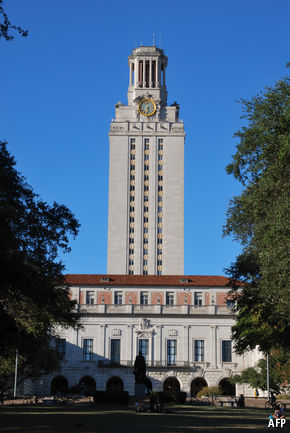Texas’s new campus carry law may yet, er, backfire

IN JUNE, Texas became the eighth state to adopt legislation allowing guns to be carried on university campuses. (In a ninth, Arkansas, only faculty are permitted to bear arms while wandering about the quads.) “Campus carry” has been a priority for gun-rights groups since the shootings in 2007 at Virginia Tech. It was bound to get a hearing in Texas, even in the absence of a grim precedent: in 1966 an engineering student at the University of Texas at Austin took half a dozen guns to the top of the clock tower that marks the centre of campus, and began what is now considered to be America’s first school shooting.
By the time it was over he had left 14 people dead, more than 30 wounded, and a generation of students with terrifying memories of the day. One of them, Jeff Wentworth, was among the legislators who filed a bill proposing campus carry in Texas, back in 2009. Over the next several sessions the legislature debated the subject at length. The arguments against it have been laid out exhaustively. UT Austin has held two public forums on the subject this term, at the student union, in the shadow of the clock tower. Most of the students who spoke were opposed to having guns on campus, but that would have been old news to the university administrators, who also opposed the law, and to the legislators, who passed it over their objections.
A wrinkle has emerged from these discussions, however. Although the legislature clearly passed a campus-carry law, it seems that lawmakers may not have read it first. On closer examination, Texas law now requires the heads of public universities to come up with “reasonable rules” about guns on campus, “after consulting with students, staff and faculty”. The strictest injunction in the law itself is a vague phrase stating that public colleges cannot “generally prohibit” Texans licensed to carry a gun from doing so on campus.
The question of whether that means universities can ban guns in classrooms, for example, is fiercely contested. Brian Birdwell, the Republican senator who drafted the bill, says he is counting on universities to adhere to “the letter and the spirit” of the law. It would be surprising and generous if any university president whose stated opposition to campus carry was ignored by the legislature were to adhere scrupulously to its wishes. And besides, in the event of a court case, it is the letter of the law that will be put on trial.
Despite widespread enthusiasm for guns in Texas, public opinion on the subject is not as clear-cut as the politics of guns on campus might imply. Republicans have controlled Texas politics for almost 20 years. That they were mysteriously thwarted by Democrats over the measure for three legislative sessions in a row suggests that some compromise may still be possible, if only behind closed doors—and, perhaps, among the university working groups that right now are hammering out what campus carry—a phrase that almost everyone seems to have a strong view on—actually means.


Nenhum comentário:
Postar um comentário